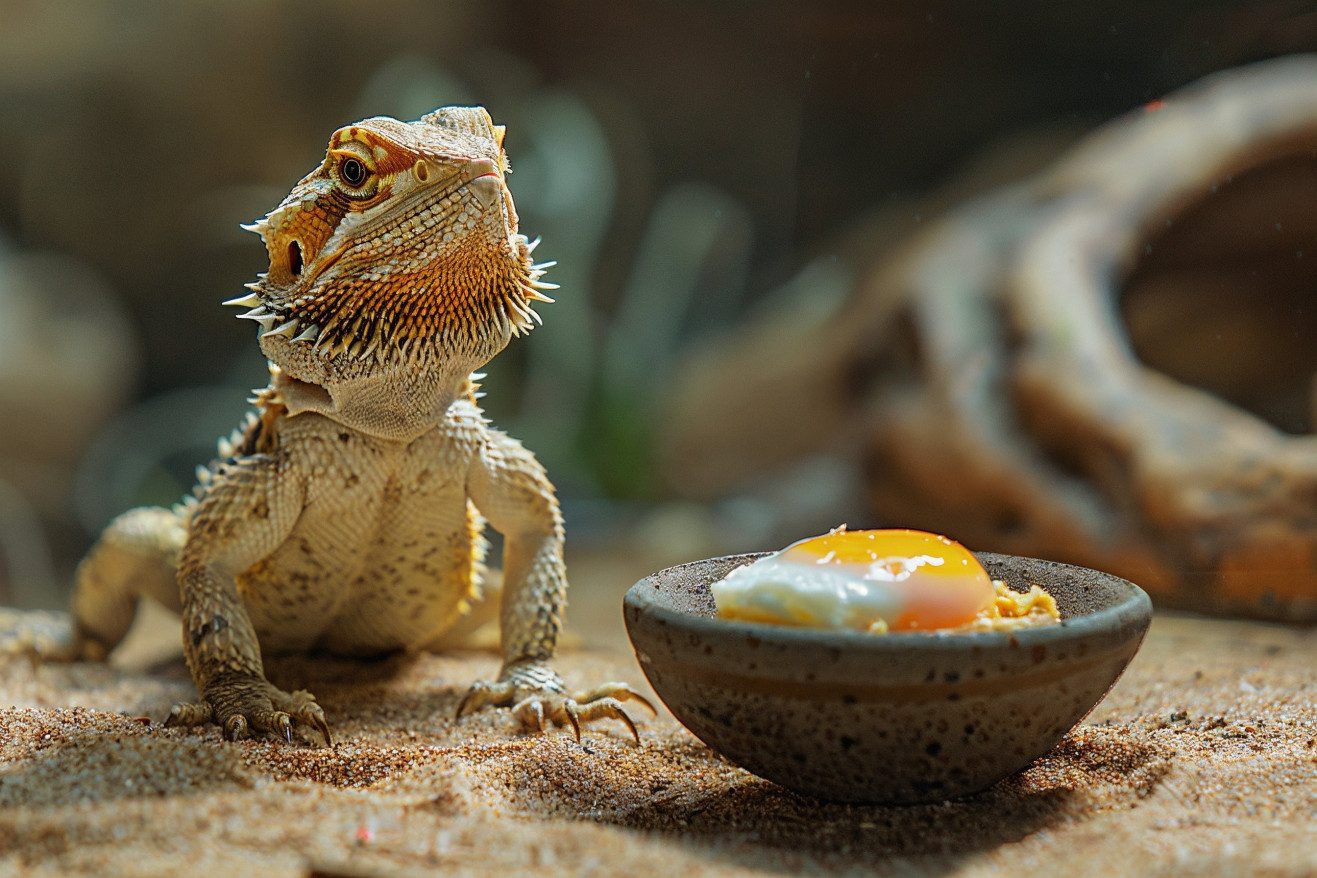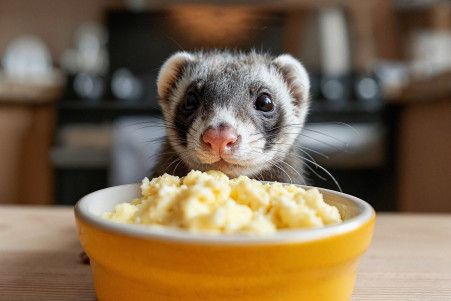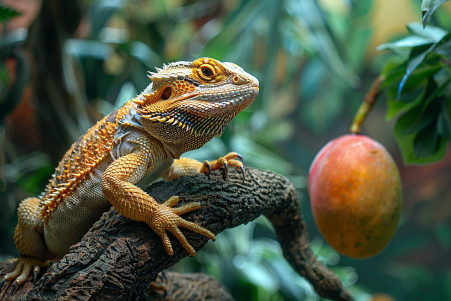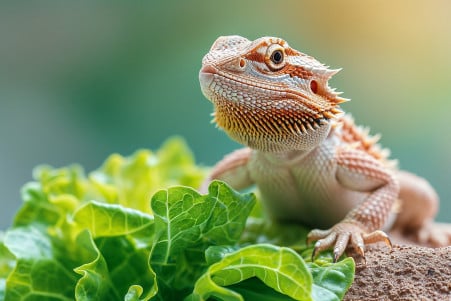Can Bearded Dragons Eat Eggs? Nutritional Guidance for Your Pet
15 March 2024 • Updated 14 March 2024

Bearded dragons have diverse diets, but you may be wondering if eggs are a healthy option for your pet. Eggs are a great source of protein, and bearded dragons can have them. However, eggs should only be given to bearded dragons as an occasional treat, and no more than half of a chicken egg should be offered every two weeks to avoid potential health problems.
Make sure to give your bearded dragon eggs that are cooked and free from any seasonings.
To better understand how eggs fit into a bearded dragon’s diet, we’ll look at studies in herpetology, reptile nutrition, and veterinary science. This will cover the dietary requirements of bearded dragons, the nutritional content of eggs, and the potential health effects of adding eggs to a dragon’s diet. Our aim is to give you a well-rounded understanding that will help you decide whether or not to feed eggs to your bearded dragon.
Can bearded dragons eat eggs?
The Power of Protein: Eggs in a Bearded Dragon’s Diet
Eggs are a nutritional powerhouse for bearded dragons, offering high-quality protein that is essential for their overall health and development. According to Reptile Supply, eggs are also packed with vitamins A, B, C, D, E, and K, and essential minerals like zinc, folate, calcium, selenium, and magnesium. This nutritional bounty can help support your bearded dragon’s health when fed as an occasional treat.
As with any animal, a bearded dragon’s diet should be as varied as possible, and eggs can help supplement their regular meals by adding both nutritional variety and taste. Studies have shown that adding eggs to your bearded dragon’s diet can help increase the nutritional value of their meals while also making them more exciting for your pet.
That said, it’s important to make sure that eggs don’t replace their primary source of protein, which is live feeders. While eggs are full of nutrients, they should be used to supplement your bearded dragon’s staple diet of insects, not replace it.
Studies on the nutritional value of eggs have shown that they can help people manage their weight and improve their overall diet quality, and the same is true for bearded dragons when eggs are fed in moderation.
In summary, while eggs are packed with important nutrients, they should be considered a supplement to your bearded dragon’s diet rather than a staple. By making sure that your bearded dragon only eats eggs occasionally, you can make sure that they get all of the benefits of eggs without the potential downsides of overconsumption.
Beware of Overindulgence: Eggs and Bearded Dragon Health
Although eggs can be a healthy part of a bearded dragon’s diet, overconsumption can lead to a number of health issues. Overconsumption of eggs can lead to an overabundance of protein, which can cause gout (a condition where uric acid builds up in the joints and causes pain) and obesity, according to Dubia.com.
In addition, the high fat content in eggs can lead to fatty liver disease, and the obesity that can result from this type of diet can lead to diabetes and heart disease.
Another issue is the calcium to phosphorus ratio. Bearded Dragon Kingdom explains that the high phosphorus content in eggs can throw off the balance needed for a bearded dragon’s bones to be healthy. This ratio needs to be maintained to ensure that the bearded dragon can absorb the calcium in its diet.
Keep an eye out for symptoms such as lethargy, swollen joints, and loss of appetite, as these could be signs that your bearded dragon has been overfed eggs. If you think that your bearded dragon is suffering from health issues due to its diet, be sure to talk to a vet for personalized advice.
To make sure that your bearded dragon is healthy and happy in the long term, make sure that you’re feeding it a varied diet that includes eggs as a treat, not a staple.
How to Feed Eggs to Bearded Dragons
If you want to feed eggs to your bearded dragon, you need to be mindful of how you prepare them to make sure they are safe and healthy. According to Reptile Supply, eggs should be cooked all the way through, either hard-boiled or scrambled, and should not contain any other ingredients. This means you should not use oil, butter, milk, or dairy products, which can cause stomach upset in lactose-intolerant bearded dragons.
Reptile Direct recommends feeding one whole quail egg or half a chicken egg at a time. In both cases, you should cut the egg into small, bite-sized pieces to prevent choking. Bearded Dragon Kingdom says that you should not feed eggs to your bearded dragon more than once every two weeks to make sure that they maintain a balanced diet.
When you buy eggs, make sure to choose organic, free-range eggs, which are less likely to have harmful residues and tend to be more nutritious. If you follow these rules, you can give your pet a safe and tasty treat that will help make sure they get the nutrition they need.
How to Balance a Bearded Dragon’s Diet: From Veggies to Protein
According to VCA Animal Hospitals, a healthy bearded dragon diet includes both plant-based and animal-based food. While baby bearded dragons are primarily insectivores, their diet slowly transitions to more plant-based as they age. In the end, the diet should be about 50% leafy greens and vegetables and 50% animal-based proteins like insects.
Calcium is extremely important to a bearded dragon’s diet, and UV light is required to help them metabolize it properly. As the Merck Veterinary Manual explains, without the right UV lighting, even a diet high in calcium won’t protect against metabolic bone disease, a common problem in captive bearded dragons.
Bearded dragons also need to make sure they’re getting enough water in their diet. VCA Animal Hospitals says that while bearded dragons should always have access to fresh water, they can also help ensure their pet’s hydration by misting the greens in their diet to make sure they’re getting water as they eat.
The number of meals and the ratio of plant-based to animal-based foods in a bearded dragon’s diet changes as they age, with babies eating one to two times a day and adults eating less often.
When it comes to eggs, it’s important to feed them in moderation. Dragon’s Diet explains that feeding a bearded dragon up to half an egg every other week can help ensure they get the vitamins and minerals they need without causing health problems.
In terms of diet, this means that while eggs can be a good addition to a bearded dragon’s diet, they should be fed in moderation as part of the complex dietary needs of a bearded dragon.
Conclusion: The Bearded Dragon’s Egg-cellent Adventure
As part of the ongoing search for a healthy and diverse diet for bearded dragons, eggs can be a valuable addition, providing a nutrient-dense source of protein and essential vitamins that can help promote wellness.
However, as discussed throughout this article, it’s important to remember that the key is in the dosage. Both Reptile Supply and Hepper caution that if bearded dragons eat too many eggs, it can lead to health problems like obesity and gout that would outweigh the potential benefits.
A healthy diet for these reptiles includes a mix of animal and plant-based foods, according to VCA Animal Hospitals and Bearded Dragon Kingdom. By only occasionally giving your bearded dragons—no more than half an egg every other week for adults—eggs, you can make sure that your scaly friend gets the nutrients they need without the potential downsides.
Of course, it’s also important to remember that a healthy diet should be tailored to the individual animal. So, we recommend that you work with a vet to get personalized dietary recommendations. With the help of a professional and the information provided in this article, your bearded dragon can live a long, healthy life with the occasional egg-based treat.


